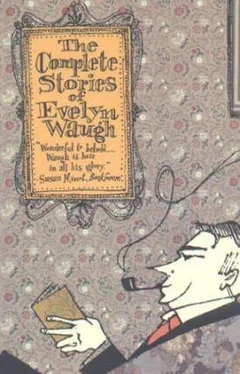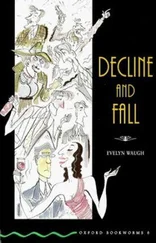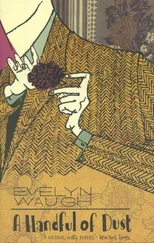Evelyn Waugh - The Complete Stories Of Evelyn Waugh
Здесь есть возможность читать онлайн «Evelyn Waugh - The Complete Stories Of Evelyn Waugh» весь текст электронной книги совершенно бесплатно (целиком полную версию без сокращений). В некоторых случаях можно слушать аудио, скачать через торрент в формате fb2 и присутствует краткое содержание. Год выпуска: 1998, ISBN: 1998, Жанр: Классическая проза, на английском языке. Описание произведения, (предисловие) а так же отзывы посетителей доступны на портале библиотеки ЛибКат.
- Название:The Complete Stories Of Evelyn Waugh
- Автор:
- Жанр:
- Год:1998
- ISBN:0-316-92546-2
- Рейтинг книги:3 / 5. Голосов: 1
-
Избранное:Добавить в избранное
- Отзывы:
-
Ваша оценка:
- 60
- 1
- 2
- 3
- 4
- 5
The Complete Stories Of Evelyn Waugh: краткое содержание, описание и аннотация
Предлагаем к чтению аннотацию, описание, краткое содержание или предисловие (зависит от того, что написал сам автор книги «The Complete Stories Of Evelyn Waugh»). Если вы не нашли необходимую информацию о книге — напишите в комментариях, мы постараемся отыскать её.
The Complete Stories Of Evelyn Waugh — читать онлайн бесплатно полную книгу (весь текст) целиком
Ниже представлен текст книги, разбитый по страницам. Система сохранения места последней прочитанной страницы, позволяет с удобством читать онлайн бесплатно книгу «The Complete Stories Of Evelyn Waugh», без необходимости каждый раз заново искать на чём Вы остановились. Поставьте закладку, и сможете в любой момент перейти на страницу, на которой закончили чтение.
Интервал:
Закладка:
Yourself,
Evelyn
I
Peter Audley awoke with “second bell” ringing dismally down the cloisters and rolling over in bed looked at his watch. Reassured that he had another five minutes before he need begin getting up, he pulled his rug up over his shoulders and lay back gazing contentedly down the dormitory, which was already stirring with the profoundly comforting sounds made by other people dressing. The splashing of the showers next door, the chipping of the thick crockery and the muttered oaths at backstuds accentuated the pleasure of the last minutes.
Early school was kept up practically all the year round at Selchurch, which took a certain pride in the gloom of these early mornings. Peter, however, had got his “privileges” which took away the bitterest sting of frantic punctuality and allowed him, after reporting to his form master, to sit out and work in his study.
With a heave he got out of bed and went to wash. The showers looked singularly uninviting but the water for the basins was stone cold—the furnaces were not lit until midday in March 1918—and with rising gloom he returned shivering and half dry to the dormitory. Some fanatic had opened one of the high Gothic windows and a cold gust of wind swept down the room. There was a chorus of protestastion and the window was closed. He dressed dully and leaving the dormitory at a few minutes past seven crossed the quad to “report.” Several fags, laden with books, dashed past him, trying desperately to avoid recognition by the prefect “taking lates.” His form master nodded to him and he turned on his heel and made for his study. The gravel was dark with fallen rain, the sky menacing with monstrous rough hewn clouds; over everything spread a fine, wet mist.
The handle of his study door was cold; he went in, kicked the door to and fell into an easy chair gazing round the tiny room. It was pleasant enough and he had spent considerable pains on it, but this morning it afforded him no pleasure.
The carpet was black—a burst of aestheticism which he had long regretted as it took a great deal of brushing and earned his study the name of the “coal cellar”—and the walls distempered a bluish grey. On them were hung four large Medici prints, the gift of his grandmother but his own choice; Botticelli’s Mars & Venus—he had had some difficulty over this with his house master, to whom a nude was indecent whether it came from the National Gallery or La Vie Parisienne—Beatrice d’Este, Rembrandt’s “Philosopher” and Holbein’s Duchess of Milan. These he liked either because they were very beautiful or because they gave an air of distinction which his friends’ Harrison Fishers and Rilette pictures lacked. The curtains, cushions on the window seat and table cloth were blue; the whole room was pleasantly redolent of the coffee of the evening before.
Peter, however, lay back staring gloomily at the grey block of class rooms opposite. It was Saturday morning and Saturday afternoon was the time chosen, as being the longest uninterrupted time in the week, for the uniform parade. He could just remember when, his first term, summer 1914, it had been the great social time of the week when tea was brewed and quantities of eclaires eaten, and now that he had grown to an age to have a study and enjoy these things, they were all blotted out and from two to six he would have to manoeuvre a section of sullen fags over the wet downs in some futile “attack scheme.”
He knew exactly what would happen. They would fall in on one of the quads and be inspected—that meant half an hours work with reeking brasso and s.a.p. cleaning his uniform and equipment. They would then march up to the downs and in a driving wind stand easy while the O.C. explained the afternoons work. Ordnance maps would be issued to all N.C.O.’s with which to follow the explanation; these always bulged with incorrect folding and flapped in the wind.
It was never considered sufficient for one company merely to come and attack the other; a huge campaign of which they formed a tiny part would have to be elaborated. A company would be the advanced guard of part of an army, which had landed at Littlehampton and was advancing upon Hasting, intending to capture important bridge heads on the local river on their way; B company, with white hat bands, would be a force set to hold the spur of the downs above the Sanatorium cooperating with hypothetical divisions on either flank, until another division could arrive from Arundel. Rattles would be issued to serve as Lewis guns and this game of make-believe would go on for three hours, with extreme discomfort to both sides, when whistles and bugles would sound and the corps form up again for a criticism of the afternoon’s work. They would be told that, when the parade was dismissed, all rifles were to be wiped over with an oily rag before being returned to the armoury and that all uniforms were to be back in the lockers before six o’clock. They would then dismiss, hungry, bad tempered and with only twenty minutes in which to change for Chapel.
He hated the corps and all the more now that he had to take it seriously. He was seventeen and a half; next year, if the war was still on, as it showed every sign of being, would see him fighting. It brought everything terribly near. He had learnt much of what it was like over there from his brother, but Ralf saw everything so abstractedly with such imperturbable cynicism. Peter flattered himself that he was far more sensitive and temperamental. He was sure that he would not be able to stand it; Ralf had won the D.S.O. some months ago.
He collected his thoughts with a start and looked at his time table. He had to finish the chapter of Economics which he had left the evening before. The book was lying where he had tossed it and, like everything that morning, looked singularly uninviting. It was bound in a sort of greasy, limp, oil cloth, “owing,” a label half scraped off the back proclaimed, “to shortage of labour”; it was printed crookedly on a thin greyish paper with little brown splinters of wood in it; it was altogether a typical piece of wartime workmanship. He took it up with listless repulsion and began to read.
“From considerations of this nature,” he read, “which, while not true of every person, taken individually, are yet on the average true, it may be inferred, with approximate accuracy, that by adding to the wealth of the poor, something taken, by some recognised and legal process, from the wealth of the rich, while some dissatisfaction as well as satisfaction is inevitably caused, yet, provided that the poor be greater in number than the rich, the satisfaction is greater than the dissatisfaction. Inequality of wealth, insofar as…”
It was all ineffably tedious. He tossed the book on to the table in the corner and taking up a novel passed the next half hour in dissatisfied gloom.
II
The clock in the quad struck quarter to eight and voices and shuffling sounded across the gravel as the forms began emptying. The door of his study was burst open and Bellinger came in.
“Edifying spectacle of history specialist at work! Here have I been doing geography with the ‘door mouse’ for three mortal quarters of an hour, while you read low novels.”
Bellinger was in the army class, a cheery soul, athletic, vacant, with an obsession for clothes. This was the only subject about which he could talk; he was always perfectly dressed himself and had earned something of a reputation by it. People would bring him patterns of cloth and consult him when they were getting suits, which was complimentary, although they never took his advice. It was said of him that he had once cut the headmaster in London because he met him wearing a brown overcoat with evening dress.
Читать дальшеИнтервал:
Закладка:
Похожие книги на «The Complete Stories Of Evelyn Waugh»
Представляем Вашему вниманию похожие книги на «The Complete Stories Of Evelyn Waugh» списком для выбора. Мы отобрали схожую по названию и смыслу литературу в надежде предоставить читателям больше вариантов отыскать новые, интересные, ещё непрочитанные произведения.
Обсуждение, отзывы о книге «The Complete Stories Of Evelyn Waugh» и просто собственные мнения читателей. Оставьте ваши комментарии, напишите, что Вы думаете о произведении, его смысле или главных героях. Укажите что конкретно понравилось, а что нет, и почему Вы так считаете.












